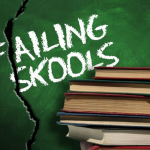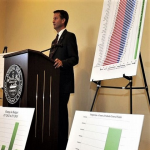American Decline can be Reversed through Grassroots Action
Public education has been decaying on the inside for decades. Educators blame poverty, poor parenting, changing demographics, the growth of hedonistic popular culture, insufficient funding, and myriad other factors. Seldom mentioned, however, is education’s failure to adapt and overcome these conditions.
In the view of most educators, schools are doing all they can--an explanation that is contradicted by the measurable differences in effectiveness among teachers within the same school and between schools within the same district. Value-added assessments show that high performing teachers and schools can bring about twice as much achievement gain per year as low performers--and that is a level-playing field comparison. Substantial improvement is readily attainable.
In fact, public education was created as a means of affording each new generation of Americans an opportunity to succeed regardless of the conditions of their birth. If schools can’t overcome these conditions, they are failing at their basic mission.
Thankfully, not all schools and districts indulge themselves in excuses. Instead, they accept their historic mission and reach their goals despite adversity. Probably the clearest example of such schools today are among the charter schools serving disadvantaged minority students. They take students whose demographic status predicts failure and turn out competent graduates.
How they reach that end is through measurably effective teaching, i.e., teaching that is supported by sound research, based on continuous and direct observations of learning, and spurred by results-focused leadership. Of these key elements, leadership is the part that is most often missing in public schools. Successful school leadership requires more than well-trained educators. It takes a school board that has informed public support and sets learning-focused policy.
Schools and districts all over the United States produce mediocre outcomes because of weakness at the level of boards and superintendents. The underlying cause of this weakness is that electorate and the board are frequently in the dark about the true state of local schooling outcomes. As a consequence, they remain complacent and unengaged. School board elections are almost universally low turnout affairs with few interesting issues at stake. They are typically hinge on matters of concern to narrow special interests, not accountability for academic outcomes.
Reform is Attainable
These circumstances and the poor student outcomes that they facilitate are neither inevitable nor irreversible but they do require grassroots action—action that begins with a critical mass of informed citizens. School reform–as old as public schooling itself—starts with reformers who are willing to do their homework and inform fellow citizens..
The items listed on this page address various facets of the local school reform process:
- Why the public officials and local citizens are often in the dark about their schools. School news is filtered.
- Why school boards are often captives of special interests. No one else pays attention.
- How to form a grassroots school reform organization. Action needed.
- An example of the barriers faced by reform efforts. Better outcomes are not everyone’s top priority.
- An example of how local officials equipped with consumer-friendly tools can take action. Local officials can be reform leaders
- Why the lack of effective reading instruction is arguably the greatest barrier to better schools. Poor schools create hidden costs.
Americans Know Very Little About Local School Quality

In an Investors Business Daily op ed, the president of the Education Consumers Foundation maintains that Americans are largely kept in the dark about the performance of their local schools. Without a convenient and understandable scoreboard, there…
Local School Boards are key to Better Outcomes, and Reversing American Decline

Local school boards may be the key to reversing American educational and economic decline. Educators blame school outcomes on poverty but public schools were created to overcome poverty and they were remarkably successful in doing…
Organizing to Improve Local Schools

What is an Education Consumers Association? An Education Consumers Association (ECA) is local or state level citizen group that is dedicated to empowering parents, school board members, employers, and all others who have a consumer’s…

In 2014, a request to open additional schools by the highly successful KIPP Academies, was challenged before the Nashville (TN) school board on the grounds that its existing school was not performing as well as others in the district. ECF’s charts showed that argument to be false.
A Mayor Uses Consumer-Friendly Charts to Make his Case

Are Tennessee’s Children Learning to Read? Mayor Tim Burchett Asks the Question in Knoxville. Knoxville mayor Tim Burchett is leading on education, highlighting the importance of early literacy: “I say, before we raise taxes, let’s tackle…
J. E. Stone: School system must stress reading skills

In this June 1, 2013 opinion piece, featured in the Knoxville News Sentinel, the president of the Education Consumers Foundation, comments on the recent reorganization of a low-performing school in the city, noting the tremendous costs of failing…
